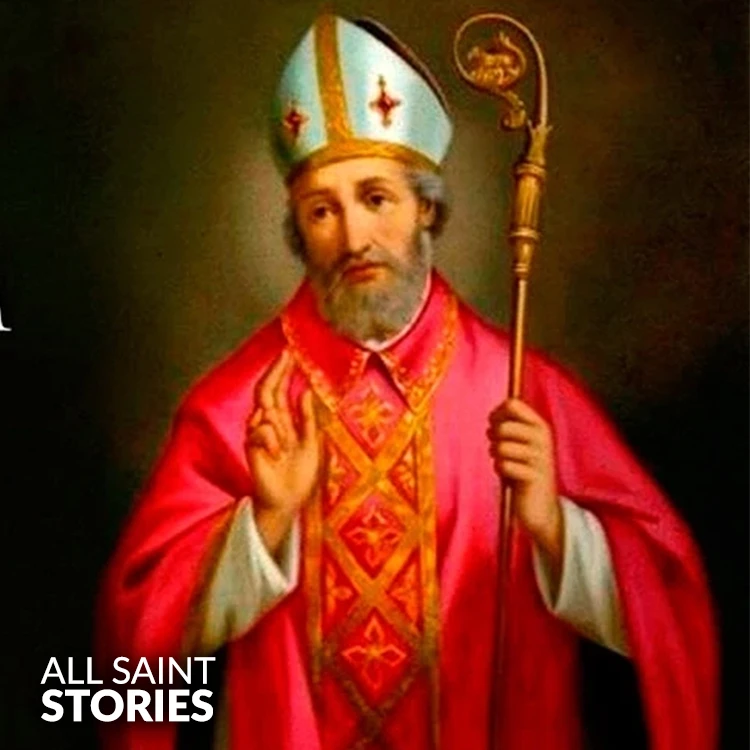"O Lord, our God, grant us the grace to desire you with our whole heart, that in desiring you we may seek and find you; that finding you we may love you, and loving you we may despise the sins from which you have redeemed us."
ST. ANSELM
ST. ANSELM

St. Anselm of Canterbury (1033–1109) was a Benedictine monk, theologian, and Archbishop of Canterbury known for his intellectual contributions to Scholasticism. His ontological argument for God's existence and theological works, including Cur Deus Homo, shaped Christian doctrine. He defended Church independence against royal interference and was exiled twice for his principles.
St. Anselm was born in 1033 in Aosta, Italy, into a noble Lombard family. His mother, Ermenberga, nurtured his piety, but after her death, his father’s harshness led him to leave home. Anselm traveled through France before joining the Benedictine Abbey of Bec in Normandy in 1060, where he studied under the esteemed scholar Lanfranc. Recognized for his intellect and virtue, Anselm became Prior within three years and later succeeded Lanfranc as Abbot.
At Bec, Anselm wrote groundbreaking philosophical and theological works, including Monologium and Proslogium, in which he developed the famous ontological argument for God's existence. His influence extended beyond the monastery as he frequently visited England to oversee its estates. In 1093, despite his reluctance, he was appointed Archbishop of Canterbury to counter King William II’s encroachments on the Church.
Following Archbishop Lanfranc’s death, King William II had deliberately left Canterbury’s See vacant to exploit its wealth. Anselm, devoted to Church reforms and ecclesiastical independence, soon clashed with the king. His refusal to compromise led to his exile. He was later recalled by King Henry I in 1100, yet conflicts over lay investiture persisted, forcing him into a second exile. The dispute was resolved in 1107 when Henry relinquished his claim to appoint bishops, allowing the Church greater autonomy.
Anselm’s theological contributions were profound. In Cur Deus Homo (Why God Became Man), he refuted the belief that Satan had a rightful claim over humanity due to sin, instead arguing that sin was an infinite offense against God, requiring Christ’s atonement through His sacrifice. His logical approach to theology earned him the title "Father of Scholasticism," and in 1720, he was declared a Doctor of the Universal Church.
A strong advocate for justice, Anselm opposed the slave trade and defended the Filioque doctrine, which affirms that the Holy Spirit proceeds from both the Father and the Son. His legacy remains in his writings, which continue to shape theological discourse. He passed away in Canterbury on April 21, 1109, leaving behind a legacy of faith, reason, and unwavering commitment to the Church.
Video Not Found
No images uploaded for this saint yet.
The information you see here may be either accurate or might contain some discrepancies, as it is gathered from various sources. If you believe that any part of the details about this saint is incorrect or incomplete, we kindly invite you to share your suggestions or corrections with us. Your insights are invaluable in helping us ensure that we provide the most accurate and reliable information.
We encourage you to use the form on the left to submit any corrections or additional information you may have. Whether it's a small detail or a larger correction, we will carefully review your submission and update the information accordingly. Your contributions will not only help us maintain the integrity of the content but also benefit others who seek to learn more about this saint. We greatly appreciate your assistance in making our information more accurate and complete.
Please rest assured that your personal details will remain confidential, and your suggestions will be handled with the utmost care. Together, we can ensure that the information about this saint is as accurate and informative as possible. Thank you for your time and contribution!
If you have any suggestion about ST. ANSELM
Your suggestion will help improve the information about this saint. Your details will not be disclosed anywhere.
© 2025 Copyright @ www.allsaintstories.com

 English
English
 Italian
Italian
 French
French
 Spanish
Spanish
 Malayalam
Malayalam
 Russian
Russian
 Korean
Korean
 Sinhala
Sinhala
 Japanese
Japanese
 Arabic
Arabic
 Portuguese
Portuguese
 Bantu
Bantu
 Greek
Greek
 German
German
 Dutch
Dutch